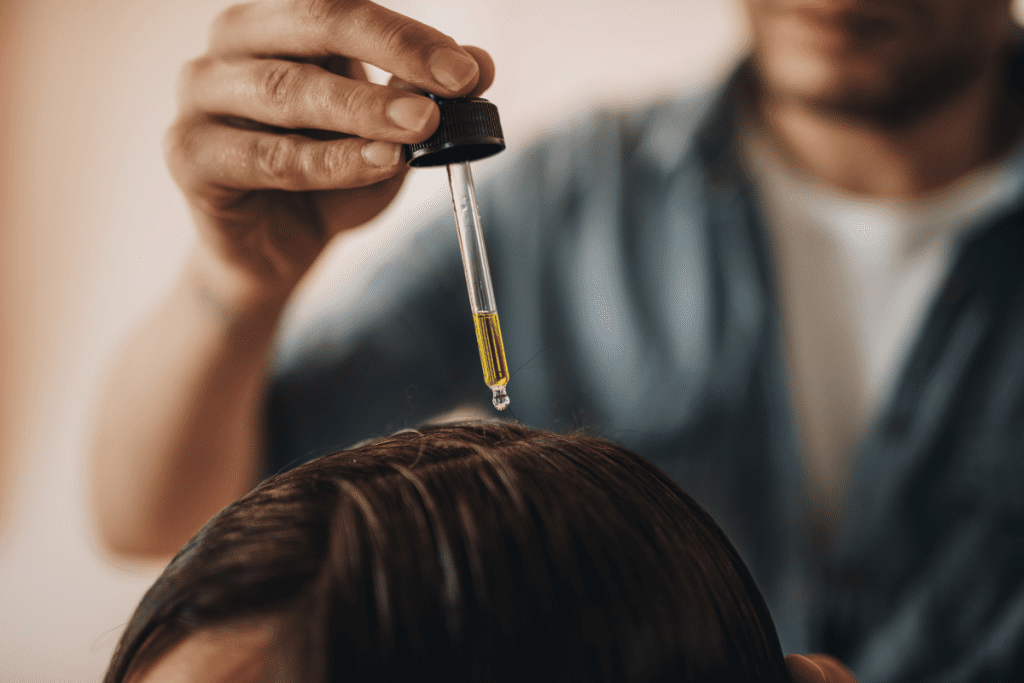
Introduction
Hair loss is a common concern that affects millions of people worldwide. Whether it’s due to genetics, hormonal imbalances, stress, or other factors, watching strands of hair fall out can be distressing. In recent years, CBD oil has emerged as a potential solution for hair loss, offering a natural and promising alternative to traditional treatments. But can CBD oil truly break the pattern of hair loss? In this article, we’ll delve into the science behind CBD oil’s effects on hair health and explore its potential benefits in combating hair loss.

Understanding Hair Loss
Male and female pattern baldness leading
Genetic Predisposition and Hormonal Imbalances
Before delving into the role of CBD oil in hair loss treatment, it’s essential to understand the underlying causes of hair loss. For many individuals, genetics play a significant role, with conditions such as male and female pattern baldness leading to gradual hair thinning and eventual baldness. Hormonal imbalances, such as those associated with thyroid disorders or fluctuations in testosterone levels, can also contribute to hair loss.
Stress and Environmental Factors
Additionally, environmental factors and lifestyle choices can exacerbate hair loss. Chronic stress, poor diet, exposure to pollutants, and harsh hair treatments can all take a toll on hair health, leading to increased shedding and reduced hair growth.
The Science of CBD Oil
CBD interacts with the body’s endocannabinoid
What is CBD Oil?
CBD, short for cannabidiol, is a compound found in the cannabis plant. Unlike its counterpart, THC (tetrahydrocannabinol), CBD is non-psychoactive, meaning it doesn’t produce the “high” typically associated with cannabis use. Instead, CBD interacts with the body’s endocannabinoid system, which plays a crucial role in regulating various physiological functions, including mood, pain sensation, and, importantly, hair growth.
How Does CBD Oil Work for Hair Loss?
CBD oil contains a myriad of beneficial compounds, including vitamins, minerals, fatty acids, and antioxidants, all of which are essential for maintaining healthy hair and scalp. One of the primary ways CBD oil may help combat hair loss is by promoting a healthy scalp environment. CBD’s anti-inflammatory properties can help reduce inflammation, irritation, and itchiness, which are common symptoms associated with conditions like alopecia and dandruff.
Furthermore, CBD oil may stimulate hair follicles and encourage hair growth through its interaction with cannabinoid receptors in the skin. Research suggests that CBD may prolong the anagen (growth) phase of the hair growth cycle while inhibiting the telogen (resting) phase, resulting in thicker, fuller hair over time.
The Benefits of CBD Oil for Hair Loss
By creating a conducive environment for hair follicles
Promotes Scalp Health
A healthy scalp is crucial for optimal hair growth, and CBD oil’s anti-inflammatory and moisturizing properties can help maintain scalp health by reducing inflammation, soothing irritation, and hydrating the skin. By creating a conducive environment for hair follicles to thrive, CBD oil may help prevent hair loss and promote the growth of new hair strands.
Stimulates Hair Growth
Several studies have shown that CBD oil may possess hair growth-promoting properties. A 2019 study published in The Journal of Dermatological Science found that CBD stimulated hair growth by activating the genes responsible for hair follicle proliferation and promoting the transition of hair follicles from the resting phase to the growth phase.
Strengthens Hair Follicles
CBD oil is rich in essential fatty acids, such as omega-3 and omega-6, which are crucial for maintaining the strength and integrity of hair follicles. By nourishing the scalp and hair follicles with these essential nutrients, CBD oil may help prevent breakage, improve hair elasticity, and promote overall hair health.
Reduces Stress and Anxiety
Chronic stress and anxiety can contribute to hair loss by disrupting the hair growth cycle and triggering conditions like telogen effluvium. CBD oil has been shown to have anxiolytic (anxiety-reducing) effects, helping individuals manage stress and promote relaxation. By reducing stress levels, CBD oil may indirectly support hair growth and prevent further hair loss.
Conclusion
While more research is needed to fully understand the mechanisms behind CBD oil’s effects on hair loss, the existing evidence suggests that it holds promise as a natural and effective treatment option. By promoting scalp health, stimulating hair growth, and reducing stress, CBD oil may help break the cycle of hair loss and restore confidence to those struggling with this common condition. If you’re considering incorporating CBD oil into your hair care routine, it’s essential to choose high-quality products from reputable brands and consult with a healthcare professional for personalized advice. With continued research and exploration, CBD oil may emerge as a valuable tool in the fight against hair loss, offering hope to individuals seeking safe and effective solutions for healthier, fuller hair.
